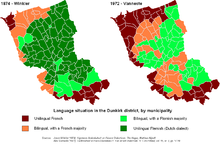|
West Flemish
West Flemish (West-Vlams or West-Vloams or Vlaemsch (in French Flanders), Dutch: West-Vlaams, French: flamand occidental) is a collection of Low Franconian varieties spoken in western Belgium and the neighbouring areas of France and the Netherlands. West Flemish is spoken by about a million people in the Belgian province of West Flanders, and a further 50,000 in the neighbouring Dutch coastal district of Zeelandic Flanders (200,000 if including the closely related dialects of Zeelandic) and 10-20,000 in the northern part of the French department of Nord.[1] Some of the main cities where West Flemish is widely spoken are Bruges, Dunkirk, Kortrijk, Ostend, Roeselare and Ypres. West Flemish is listed as a "vulnerable" language in UNESCO's online Red Book of Endangered Languages.[2]
   PhonologyWest Flemish has a phonology that differs significantly from that of Standard Dutch, being similar to Afrikaans in the case of long E, O and A. Also where Standard Dutch has sch, in some parts of West Flanders, West-Flemish, like Afrikaans, has sk. However, the best known traits are the replacement of Standard Dutch (pre-)velar fricatives g and ch in Dutch (/x, ɣ/) with glottal h [h, ɦ],. The following differences are listed by their Dutch spelling, as some different letters have merged their sounds in Standard Dutch but remained separate sounds in West Flemish. Pronunciations can also differ slightly from region to region.
The absence of /x/ and /ɣ/ in West Flemish makes pronouncing them very difficult for native speakers. That often causes hypercorrection of the /h/ sounds to a /x/ or /ɣ/. Standard Dutch also has many words with an -en (/ən/) suffix (mostly plural forms of verbs and nouns). While Standard Dutch and most dialects do not pronounce the final n, West Flemish typically drops the e and pronounces the n inside the base word. For base words already ending with n, the final n sound is often lengthened to clarify the suffix. That makes many words become similar to those of English: beaten, listen etc. The short o ([ɔ]) can also be pronounced as a short u ([ɐ]), a phenomenon also occurring in Russian and some other Slavic languages, called akanye. That happens spontaneously to some words, but other words keep their original short o sounds. Similarly, the short a ([ɑ]) can turn into a short o ([ɔ]) in some words spontaneously. The diphthong ui (/œy/) does not exist in West Flemish and is replaced by a long u ([y]) or a long ie ([i]). Like for the ui, the long o ([o]) can be replaced by an [ø] (eu) for some words but a [uo] for others. That often causes similarities to ranchers English. [clarification needed] Here are some examples showing the sound shifts that are part of the vocabulary:
GrammarPlural formPlural forms in Standard Dutch most often add -en, but West Flemish usually uses -s, like the Low Saxon dialects and even more prominently in English in which -en has become very rare. Under the influence of Standard Dutch, -s is being used by fewer people, and younger speakers tend to use -en. Verb conjugationThe verbs zijn ("to be") and hebben ("to have") are also conjugated differently.
Double subjectWest Flemish often has a double subject.
ArticlesStandard Dutch has an indefinite article that does not depend on gender, unlike in West Flemish. However, a gender-independent article is increasingly used. Like in English, n is pronounced only if the next word begins with a vowel sound.
Conjugation of yes and noAnother feature of West Flemish is the conjugation of ja and nee ("yes" and "no") to the subject of the sentence. That is somewhat related to the double subject, but even when the rest of the sentence is not pronounced, ja and nee are generally used with the first part of the double subject. This conjugation can be negated with the extra word, toet ([tut]), or strenght strengthened by adding mo- or ba- (or both).
See also
References
Further reading
External linksWikimedia Commons has media related to West Flemish language. West Flemish edition of Wikipedia, the free encyclopedia |
|||||||||||||||||||||||||||||||||||||||||||||||||||||||||||||||||||||||||||||||||||||||||||||||||||||||||||||||||||||||||||||||||||||||||||||||||||||
